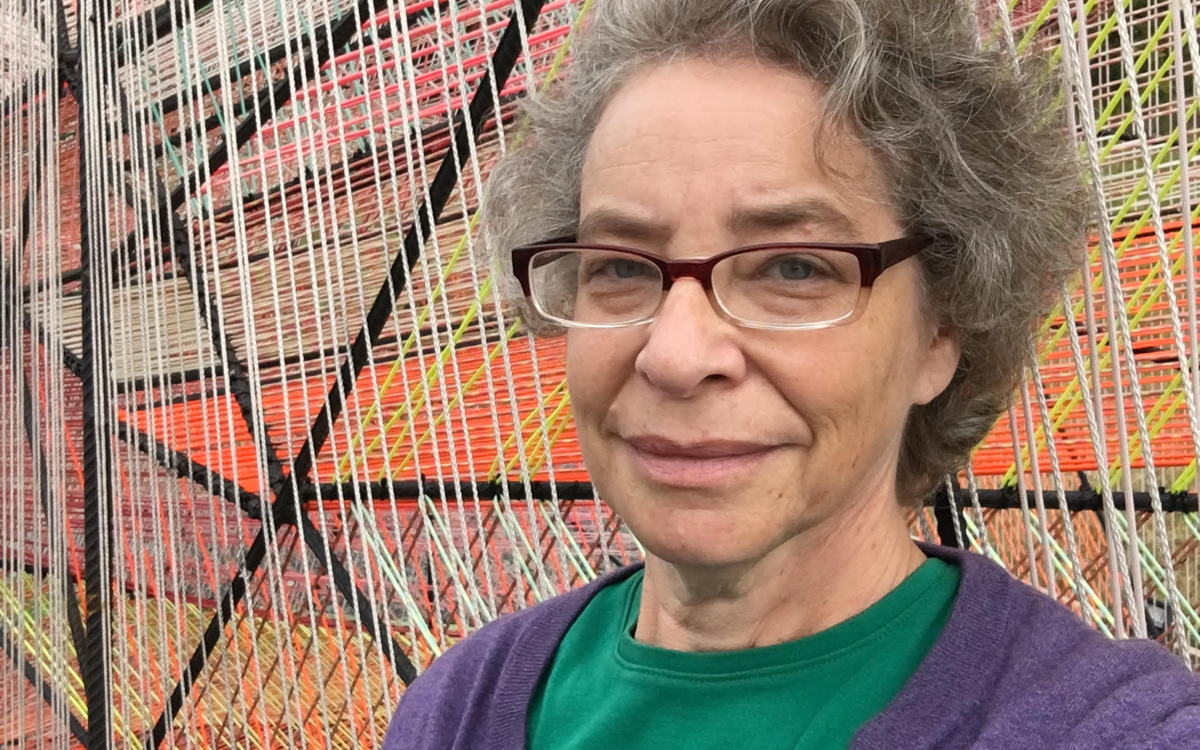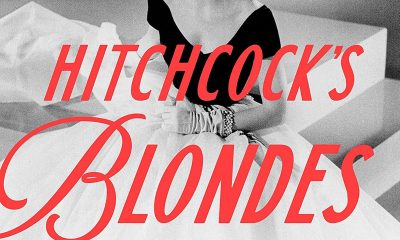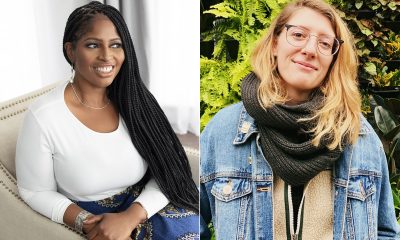Arts & Entertainment
‘D.C. queer poets doing some of the most innovative writing’
Kim Roberts on Washington as home to thriving poetry scene

Cheer up! There’s hope! April isn’t just for filing your taxes. It’s National Poetry Month!
Few people are more important — more vital — to poetry in Washington, D.C. than queer poet, editor, and literary historian Kim Roberts.
It’s hard to imagine any bard in the D.C. region who hasn’t been enriched by Roberts’s editing, poetry, or understanding of history.
“Kim Roberts brings the past and present together with elegance and intelligence,” said Maryland Poet Laureate Grace Cavalieri in an email to the Blade.
“Poetry’s past has gone nowhere at all, thankfully, because of Kim’s work,” Cavalieri, producer and host of the public radio show and Apple podcast “The Poet and the Poem,” said.
D.C. has been home to numerous poets from its founding to the Civil War to World War I to World War II to our COVID era, Roberts, 60, told the Blade in an interview.
“D.C. is a company town like Las Vegas,” Roberts, who moved to Washington, D.C. 35 years ago, said. “Because the federal government is here, people don’t think there’s poetry in D.C.”
“We get overlooked,” she added.
You might think poetry is a snooze or only for residents of Mount Olympus who are untethered to earthly hopes, fears, loves and losses. But you’d be wrong.
All sorts of people – from politicos to journalists to teachers to lovers to mourners — seek out and write poetry.
“You turn to poetry in times of great emotion like funerals and weddings,” said Roberts, who is the author of six books of poems.
Recently, this hit close to home for Roberts. “COVID’s been so hard for so many people,” she said, “I feel a bit guilty. Because at my age, I fell in love during the pandemic!”
Roberts was gobsmacked (in a good way) by love — she didn’t expect to find it so late in life.
At this transformative juncture, Roberts turned to poetry. “My style changed,” she said, “I became confessional.”
Much of her previous poetry has been about other people. The poems in her 2015 collection “Fortune’s Favor: Scott in the Antarctic,” for example, are in the “voice” of explorer Robert Falcon Scott.
“The Scientific Method,” her 2017 book, combines poems about Thomas Alva Edison and Carl Sagan, “the strange mating habits of invertebrates and fish, and rondeaux about the United States presidents,” Roberts writes on her website (kimroberts.org).
Roberts’s poems about her love for her girlfriend Tracey are personal. They are filled with passion and desire.
Five of her love poems are just out from The Last Press. Roberts is the third poet to be featured in an ongoing series of accordion-fold, hand letter press poems called “Quire.” If you don’t feel the passion pulsating through Roberts love poems, check your pulse.
“My desire for you this evening/is not done, where I bridge/inopportune distance,” Roberts writes in her poem “On Roosevelt Bridge,” one of the poems in the “Quire” series, “where I cross/the river into my city, fluid/ around my heart.”
“There’s an ocean inside my belly,” Roberts writes in “Another Lapping Refrain,” one of her “Quire” poems, “and you’re making my tide rise/I want to apologize to the shore/for my past indifference to its beauty.”
The pandemic gave her permission to try different types of projects, Roberts said. One of the things she and her friend Robert Revere, a photographer, missed during the shutdowns was going to museums. Roberts and Revere co-created “Corona/Crown,” a 14-part prose poem with photographs.
“We created a “museum of our own,” Roberts said. “We combined how we imagined people would interact with visual culture with photos of real places.”
“Corona/Crown” will be published as a chapbook by WordTech Editions in the winter of 2023.
Since childhood, Roberts has felt a strong connection to the English language. “I loved the musicality of words. I made up rhymes and stories,” Roberts said, “it’s inevitable that I would write.”
Roberts earned a B.F.A. in creative writing from Emerson College, and an M.F.A. in poetry from the University of Arizona. In 2000, Roberts became the founding editor of “Beltway Poetry Quarterly,” an acclaimed journal that publishes D.C.-area poets. She retired from editing “Beltway” in 2019.
“Beltway” has published many queer poets (including a special LGBTQ issue). Richard Blanco, Regie Cabico, Jona Colson, Cheryl Clarke and Angelina Weld are among the queer poets whose work has appeared in “Beltway.”
“Publishing queer writers helps us see ourselves as part of a special literature,” Roberts said.
Roberts began to explore the history of Washington, D.C. decades ago when she arrived in D.C. “It helped me to feel connected to the city,” she said.
The anthology “By Broad Potomac’s Shore: Great Poems from the Early Days of Our Nation’s Capital,” which Roberts edited, came out in 2020. The collection covers poets, born between 1800 to 1900 through the Civil War, Reconstruction and World War I.
Their work “spans the gamut form traditional Victorian-era sentimentality through the beginnings of literary modernism,” Roberts writes in the preface.
Everyone knows about Whitman being queer, Roberts said. The anthology’s title comes from Whitman’s poem with the same title. But there have been many other queer poets throughout D.C.’s history, Roberts said.
Take Natalie Clifford Barney, a feminist poet, who lived from 1876 to 1972. Barney spent her early years in D.C. She hosted salons in Paris for artists for more than 60 years. “She was the first woman to write openly about lesbian love since Sappho,” Roberts said.
“The full-sailed rising of your body’s sweep/ – Adrift and safe on joy’s last tidal wave —,” Barney wrote in her poem “How Write the Beat of Love,” “Will toss you on the silver sands of sleep/Forgetful of the ecstasy you gave.”
Other queer poets in the “By Broad Potomac’s Shore” anthology range from Charles Warren Stoddard, whose homoerotic writing about the natives of the South Seas was inspired by Whitman’s “Calamus” poems to Rose Elizabeth Cleveland, first lady for two years for her bachelor brother President Grover Cleveland.
Roberts is as committed to LGBTQ poetry in our time in D.C. as she is to queer poetry in the city’s past.
Roberts and filmmaker Jon Gann are co-coordinating the DC Queer Pride Poem-a-Day project. In June, the Project will feature 30 poets reading a poem in short videos online. One poem will be released daily. The website will stay up after Pride. (This reporter is one of the poets who will be featured in the Project.)
“D.C. queer poets now are doing some of the most imaginative, innovative writing,” Roberts said. “It’s important to document the writing of our time.”
Sports
Bisexual former umpire sues Major League Baseball for sexual harassment
Brandon Cooper claims female colleague sexually harassed him

A fired former umpire is suing Major League Baseball, claiming he was sexually harassed by a female umpire and discriminated against because of his gender and his sexual orientation.
Brandon Cooper worked in the minor league Arizona Complex League last year, and according to the lawsuit he filed Wednesday in federal court in Manhattan, he identifies as bisexual.
“I wanted my umpiring and ability to speak for itself and not to be labeled as ‘Brandon Cooper the bisexual umpire,’” he told Outsports. “I didn’t want to be labeled as something. It has been a passion of mine to simply make it to the Major Leagues.”
But that didn’t happen. Instead of being promoted, he was fired. His suit names MLB and an affiliated entity, PDL Blue, Inc., and alleges he had endured a hostile work environment and wrongful termination and/or retaliation because of gender and sexual orientation under New York State and New York City law.
“Historically the MLB has had a homogenous roster of umpires working in both the minor and major leagues,” Cooper claims in his suit. “Specifically, to date there has never been a woman who has worked in a (regular) season game played in the majors, and most umpires are still Caucasian men. To try to fix its gender and racial diversity issue, defendants have implemented an illegal diversity quota requiring that women be promoted regardless of merit.”
Cooper claims former umpire Ed Rapuano, now an umpire evaluator, and Darren Spagnardi, an umpire development supervisor, told him in January 2023 that MLB had a hiring quota, requiring that at least two women be among 10 new hires.
According to the suit, Cooper was assigned to spring training last year and was notified by the senior manager of umpire administration, Dusty Dellinger, that even though he received a high rating in June from former big league umpire Jim Reynolds, now an umpire supervisor, that women and minority candidates had to be hired first.
Cooper claims that upon learning Cooper was bisexual, fellow umpire Gina Quartararo insulted him and fellow umpire Kevin Bruno by using homophobic slurs and crude remarks. At that time, Quartararo and Cooper worked on the same umpiring crew and being evaluated for possible promotion to the big leagues.
This season, Quartararo is working as an umpire in the Florida State League, one of nine women who are working as minor league umpires.
Cooper said he notified Dellinger, but instead of taking action against Quartararo, he said MLB ordered Cooper to undergo sensitivity training. According to his lawsuit, he was also accused of violating the minor league anti-discrimination and harassment policy.
Cooper’s suit says he met with MLB Senior Vice President of Diversity, Equity and Inclusion Billy Bean — who the Los Angeles Blade reported in December is battling cancer.
The lawsuit says at that meeting, Bean told the umpire that Quartararo claimed she was the victim, as the only female umpire in the ACL. Cooper said he told Bean Quartararo regularly used homophobic slurs and at one point physically shoved him. He also claims that he has video evidence, texts and emails to prove his claim.
But he said his complaints to Major League Baseball officials were ignored. His lawsuit said MLB passed him over for the playoffs and fired him in October. He said of the 26 umpires hired with Cooper, he was the only one let go.
Through a spokesperson, MLB declined to comment on pending litigation. Quartararo has also not publicly commented on the lawsuit.
a&e features
Eastern Shore chef named James Beard Finalist
Harley Peet creates inventive food in an inclusive space

In a small Eastern Shore town filled with boutiques, galleries, and the occasional cry of waterfowl from the Chesapeake, Chef Harley Peet is most at home. In his Viennese-inflected, Maryland-sourced fine-dining destination Bas Rouge, Peet draws from his Northern Michigan upbringing, Culinary Institute of America education, and identity as a gay man, for inspiration.
And recently, Peet was named a James Beard Finalist for Best Chef: Mid-Atlantic – the first “Best Chef: Mid-Atlantic” finalist representing the Eastern Shore.
Peet, after graduation from the Culinary Institute of America, took a position as sous chef at Tilghman Island Inn, not far from Bas Rouge. Falling in love with the Eastern Shore, he continued his passion for racing sailboats, boating, gardening, and fishing, and living his somewhat pastoral life as he opened Bas Rouge in 2016 as head chef, a restaurant part of the Bluepoint Hospitality group, which runs more than a dozen concepts in and around Easton, Md.
Coming from a rural area and being gay, Peet knew he had his work cut out for him. He was always aware that the service and hospitality industry “can be down and dirty and rough.”
Now as a leader in the kitchen, he aims to “set a good example, and treat people how I want to be treated. I also want to make sure if you’re at our establishment, I’m the first to stand up and say something.”
The Bas Rouge cuisine, he says, is Contemporary European. “I’m inspired by old-world techniques of countries like Austria, Germany, and France, but I love putting a new spin on classic dishes and finding innovative ways to incorporate the bounty of local Chesapeake ingredients.”
His proudest dish: the humble-yet-elevated Wiener Schnitzel. “It is authentic to what one would expect to find in Vienna, down to the Lingonberries.” From his in-house bakery, Peet dries and grinds the housemade Kaiser-Semmel bread to use as the breadcrumbs.
Peet works to support the LGBTQ community inside and outside of the kitchen. “I love that our Bluepoint Hospitality team has created welcoming spaces where our patrons feel comfortable dining at each of our establishments. Our staff have a genuine respect for one another and work together free of judgment.”
Representing Bluepoint, Peet has participated in events like Chefs for Equality with the Human Rights Campaign, advocating for LGBTQ rights.
At Bas Rouge, Peet brings together his passion for inclusion steeped in a sustainability ethic. He sees environmental stewardship as a way of life. Peet and his husband have lived and worked on their own organic farm for several years. Through research in Europe, he learned about international marine sourcing. Witnessing the impacts of overfishing, Peet considers his own role in promoting eco-friendly practices at Bas Rouge. To that end, he ensures responsible sourcing commitments through his purveyors, relationships that have helped create significant change in how people dine in Easton.
“I have built great relationships in the community and there’s nothing better than one of our long-standing purveyors stopping in with a cooler of fresh fish from the Chesapeake Bay. This goes especially for catching and plating the invasive blue catfish species, which helps control the species’ threat to the local ecosystem.
Through his kitchen exploits, Peet expressed a unique connection to another gay icon in a rural fine-dining restaurant: Patrick O’Connell, of three Michelin starred Inn at Little Washington. In fact, Peet’s husband helped design some of O’Connell’s kitchen spaces. They’ve both been able to navigate treacherous restaurant-industry waters, and have come out triumphant and celebrated. Of O’Connell, Peet says that he “sees [his restaurants] as canvas, all artistry, he sees this as every night is a show.” But at the same time, his “judgment-free space makes him a role model.”
Being in Easton itself is not without challenges. Sourcing is a challenge, having to either fly or ship in ingredients, whereas urban restaurants have the benefit of trucking, he says. The small town “is romantic and charming,” but logistics are difficult – one of the reasons that Peet ensures his team is diverse, building in different viewpoints, and also “making things a hell of a lot more fun.”
Reflecting on challenges and finding (and creating) space on the Eastern Shore, Peet confirmed how important it was to surround himself with people who set a good example, and “if you don’t like the way something is going … move on.”

Team DC, the umbrella organization for LGBTQ-friendly sports teams and leagues in the D.C. area, held its annual Night of Champions Awards Gala on Saturday, April 20 at the Hilton National Mall. The organization gave out scholarships to area LGBTQ student athletes as well as awards to the Different Drummers, Kelly Laczko of Duplex Diner, Stacy Smith of the Edmund Burke School, Bryan Frank of Triout, JC Adams of DCG Basketball and the DC Gay Flag Football League.
(Washington Blade photos by Michael Key)



















-

 State Department3 days ago
State Department3 days agoState Department releases annual human rights report
-

 Maryland5 days ago
Maryland5 days agoJoe Vogel campaign holds ‘Big Gay Canvass Kickoff’
-

 Politics4 days ago
Politics4 days agoSmithsonian staff concerned about future of LGBTQ programming amid GOP scrutiny
-

 District of Columbia1 day ago
District of Columbia1 day agoCatching up with the asexuals and aromantics of D.C.










